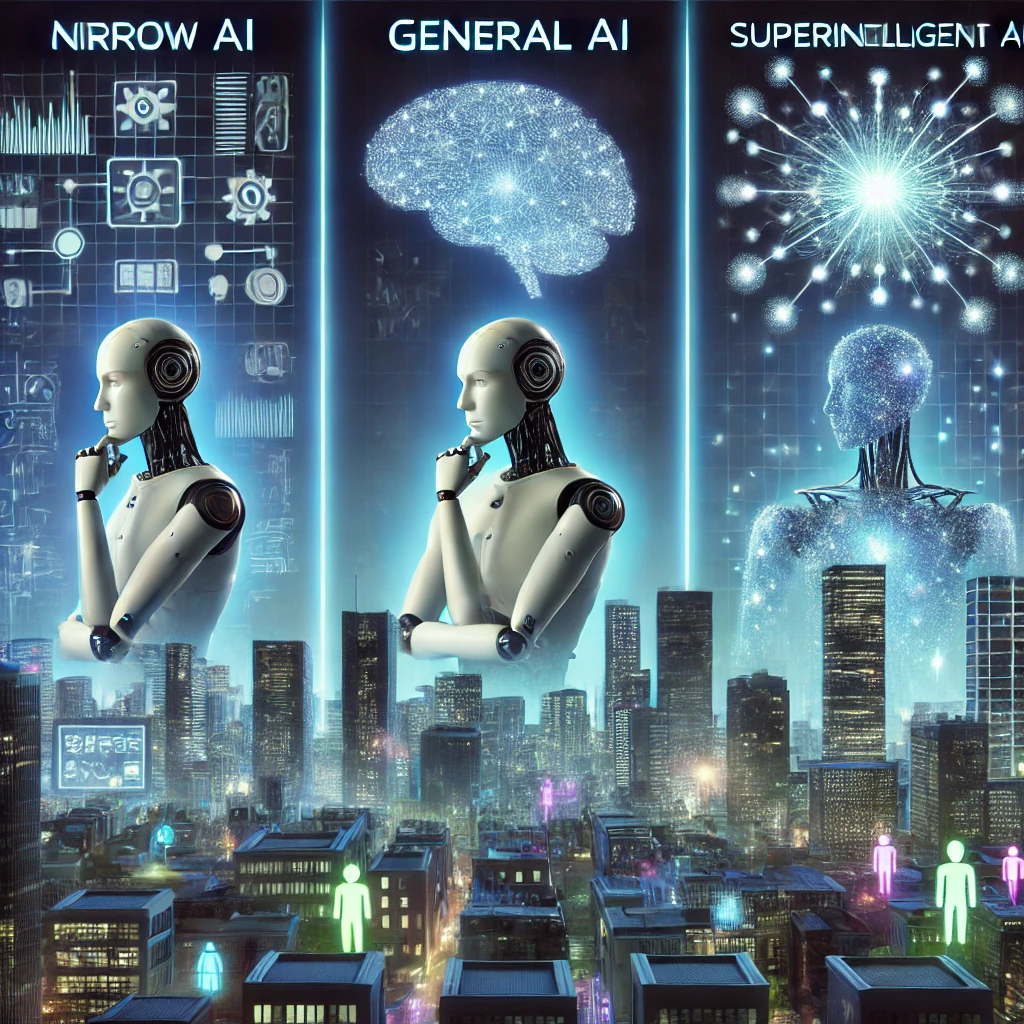Introduction
Artificial Intelligence (AI) is a broad field of computer science focused on creating systems capable of performing tasks that typically require human intelligence. These tasks include reasoning, learning, problem-solving, perception, and language understanding. AI can be categorized into several types based on its capabilities, functions, and application domains.
Types of Artificial Intelligence

1. Narrow AI (Weak AI)
Definition: Narrow AI, also known as Weak AI, refers to artificial intelligence systems that are specialized and focused on performing a specific task or a set of closely related tasks.
Characteristics:
- Task-Specific: Designed to handle specific functions such as image recognition, language translation, or playing a game.
- Limited Scope: Operates within a predefined range and lacks the ability to generalize beyond its programmed tasks.
- No Self-Awareness: Cannot understand or reason outside its specific application.
Examples:
- Voice Assistants: Siri, Alexa, Google Assistant. They can perform tasks like setting reminders or answering questions but cannot engage in conversations outside their designed capabilities.
- Recommendation Systems: Used by platforms like Netflix or Amazon to suggest products or movies based on user preferences and behavior.
- Autonomous Vehicles: Systems like Tesla’s Autopilot use machine learning to navigate roads but are limited to driving tasks and cannot engage in other activities.
2. General AI (Strong AI)
Definition: General AI, or Strong AI, refers to an advanced form of AI that has the capability to understand, learn, and apply intelligence across a wide range of tasks, much like a human being. This is still a theoretical concept and has not yet been realized.
Characteristics:
- Broad Competence: Capable of performing any intellectual task that a human can.
- Contextual Understanding: Can understand and reason about diverse subjects and contexts.
- Adaptability: Can transfer knowledge from one domain to another and learn new tasks with minimal additional input.
Examples: As of now, there are no existing examples of General AI. It remains a subject of research and speculation, with ongoing debates about its potential development and implications.
3. Superintelligent AI
Definition: Superintelligent AI refers to a hypothetical AI that surpasses human intelligence across all fields, including creativity, general wisdom, and problem-solving. This concept is often discussed in the context of long-term future scenarios.
Characteristics:
- Superior Capability: Possesses cognitive abilities that are far beyond the best human minds.
- Potential Risks: Raises concerns about control, ethical implications, and the potential impact on society and humanity.
- Speculative Nature: Discussions around Superintelligent AI are largely theoretical and focus on its potential development and consequences.
Examples: No real-world examples exist. Superintelligent AI is often explored in science fiction and theoretical discussions about the future of AI.
4. Reactive Machines
Definition: Reactive machines are basic AI systems that operate purely on the present input without the ability to form memories or use past experiences.
Characteristics:
- Immediate Response: Reacts to specific inputs with predefined responses.
- No Learning: Does not learn from past interactions or experiences.
- Simple Design: Often simpler in design and implementation compared to more advanced AI systems.
Examples:
- IBM’s Deep Blue: A chess-playing AI that defeated grandmaster Garry Kasparov. It used predefined strategies and calculations without learning from previous games.
- Basic Chatbots: Simple bots that provide scripted responses based on keywords or phrases.
5. Limited Memory AI
Definition: Limited memory AI systems have the ability to use past experiences to improve their performance and make better decisions over time. They can retain and learn from data but only within a specific context.
Characteristics:
- Experience-Based Learning: Uses historical data to inform current decision-making.
- Contextual Memory: Can remember and use past interactions within a specific domain.
- Adaptive: Capable of improving performance as more data becomes available.
Examples:
- Self-Driving Cars: Utilize past driving data to make decisions about navigation and obstacle avoidance.
- Fraud Detection Systems: Learn from historical transaction data to identify patterns indicative of fraudulent behavior.
6. Theory of Mind AI
Definition: Theory of Mind AI aims to develop systems that can understand and simulate human emotions, beliefs, intentions, and mental states. This type of AI is still in the research phase.
Characteristics:
- Emotional Understanding: Able to recognize and respond to human emotions and intentions.
- Advanced Interaction: Facilitates more natural and intuitive interactions between humans and machines.
- Research Focus: Involves ongoing research to achieve a deeper level of human-like understanding.
Examples: No existing examples; the development of Theory of Mind AI is a goal for future AI advancements.
7. Self-Aware AI
Definition: Self-Aware AI refers to AI that has a sense of self and consciousness, including awareness of its own internal states and the ability to reflect on its actions and existence.
Characteristics:
- Self-Recognition: Has an awareness of its own state and existence.
- Reflective: Capable of introspection and understanding its role and impact.
- Ethical and Philosophical Implications: Raises profound questions about the nature of consciousness and the rights of AI.
Examples: No current examples; self-aware AI remains a theoretical concept and is the subject of philosophical and ethical discussions.
Each of these types represents a different level of complexity and capability in AI. The field is rapidly evolving, and future advancements may lead to new forms of AI or refined classifications.